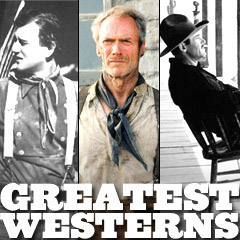
|
Greatest Westerns 1950-1955 |
| Film Title/Year/Director/Length/Studio, Setting (or Time Period) and Brief Description | |
Broken Arrow (1950)
This highly-praised, well-meaning Technicolored film was nominated for three Academy Awards (Best Supporting Actor - Jeff Chandler, Best Adapted Screenplay, and Best Cinematography), and was considered one of the first mainstream films to sympathetically portray Native-Americans in a non-condescending way. [Note: However, two of the main Apache Indian roles were played by whites with Indian makeup.] The film was set during a time of frequent skirmishes between the Apaches, led by their leader Cochise (Jess Chandler) who was opposed to the encroachment of whites. Indian scout and former Union Army soldier Tom Jeffords (James Stewart) became acquainted with Chiricahua Apache ways, learning their language, interpreting smoke signals, and was called upon to seek safe passage for white mail-carriers through Indian territory to get to Tucson. He was also asked to help seek a peace treaty (symbolized by a 'broken arrow') with the Apaches, yet a splinter group emerged led by renegade Goklia (Mexican-named Geronimo) (Jay Silverheels). Atypically, Jeffords married Sonseeahray (or 'Morningstar') (Debra Paget), an Apache girl, but the morals codes in the early 1950s forbid their miscegenation to be long-lasting, so their marriage ended tragically when she was killed during a shoot-out. When Jeffords sought revenge against one of the white renegades, his befriended Cochise advised against it, claiming that peace would be difficult. Soon after, Jeffords and Cochise learned that the murderers were executed. |

|
The Gunfighter (1950)
Known as a seminal "psychological" western, semi- Greek tragedy, and noirish character study, yet under-rated as a film about a cursed gunfighting outlaw with a bloody past. With Gregory Peck starring as reformed, legendary gunslinger Jimmy Ringo with a violent past he could not escape (with many upstarts and three vengeful murderous brothers intent on challenging him), in town hoping to visit his estranged wife Peggy (Helen Westcott) and child. His self-defensive killing of cocky gunman Eddie (Richard Jaeckel) brought forces down upon him. Sequestered (and trapped) in the mostly-empty saloon, the Palace Bar, the mustachioed Ringo was also aided by his pal, the town's sheriff named Mark Strett (Millard Mitchell). But he was tragically felled (shot in the back) in the film's conclusion by hot-shot, two-bit gunfighter Hunt Bromley (Skip Homeier). |

|
Rio Grande (1950)
The third of Ford's "Cavalry Trilogy" (the best of the three by most accounts) with John Wayne's third appearance as promoted, duty-devoted Lieutenant Colonel Kirby Yorke - he was co-starring with Maureen O'Hara as estranged southern wife Kathleen Yorke (who would also appear with him in Ford's future film The Quiet Man (1952) and three other films). Commander Yorke was at the remote outpost when his West Point flunkee cadet son Trooper Jefferson Yorke (Claude Jarman, Jr.) was assigned there for service. The younger Yorke was befriended by two older recruits: troopers Travis Tyree (Ben Johnson) and Daniel "Sandy" Boone (Harry Carey, Jr.). The western concluded with Yorke ordering his troops to rescue a caravan from the outpost (including his captured wife and other innocent women and children) seized by the Apaches and held in a small village's church, across the Rio Grande. During the battle in which Jeff displayed his heroism and bravery, his father was wounded with an arrow in the chest. |
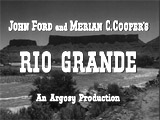
|
Winchester '73 (1950)
This 1950 western was the first of five westerns from 1950-1955 teaming James Stewart with director Anthony Mann. It had all of the stereotypical attributes of an 'oater' (ie., a law-abiding town run by Marshal Wyatt Earp (Will Geer), an exciting shoot-out rifle competition, a decisive poker card-game, a buckboard chase, Indians on the warpath attacking a besieged group of cavalry troopers, a shoot-out between desperados and a posse, a deadly saloon fight, a bank robbery, a frantic horse-chase, and a cliffside rifle duel to the death). It was noted as the film that revived westerns and set a new standard for actor's salaries - Stewart chose a profit percentage (about 50%) instead of an up-front salary, eventually earning himself between $500K and $600K. The 'psychological' western opened with a Fourth of July shooting contest in the town of Dodge City, with the "One of a Thousand" prize - an 1873 Winchester repeating rifle - the film's title character. Accompanied by his longtime friend and sidekick High-Spade (Millard Mitchell), Lin McAdam (James Stewart) won the competition, hosted by Marshal Wyatt Earp (Will Geer), but the rifle was soon stolen from him by surly outlaw 'Dutch' Henry Brown (Stephen McNally) - setting up a dogged pursuit after the deadly rifle for the remainder of the film, as it often changed hands. After being won in the contest, it next passed to the murderous outlaw who stole the gun, then to disreputable and immoral Indian gun trader Joe Lamont (John McIntire), to savage Indian brave-chief Young Bull (Rock Hudson!), briefly to young cavalry officer Doan (Tony Curtis!, billed as Anthony Curtis) and cantankerous old Army Sergeant Wilkes (Jay C. Flippen), to saloon girl Lola's (Shelley Winters) cowardly fiancee Steve (Charles Drake), to a crazed and psychotic killer, and then back to the outlaw before ending up in the hands of its rightful owner. Numerous plot storylines crossed during McAdam's chase after the stolen fabled rifle and his dark nemesis - including encounters with murderous, sneering sociopathic-psychotic 'Waco' Johnny Dean (Dan Duryea), and romance with young, golden-hearted frontier saloon-hall girl Lola Manners. The western concluded with a climactic shoot-out between Lin and 'Dutch' on a hilly rock cliffside - and the full revelation that they were estranged brothers (and 'Dutch' - actually Matthew McAdam - had murdered their father by shooting him in the back). |
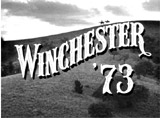
|
Bend of the River (1952)
The second of five westerns pairing director Mann with James Stewart, in the director's first Technicolored western. Ex-outlaw Glyn McLyntock (James Stewart) with a questionable past served as a scout for an Oregon-bound wagon train of farmers in the late 1840s, assisted by former Missouri border raider and horse-thief Emerson Cole (Arthur Kennedy). After arriving in Portland, Oregon, the scheming and unreformed Cole (working with corrupt steamboat owner, town saloon owner, and supplier Tom Hendricks (Howard Petrie)) abducted the leader of the settlers Jeremy Baile (Jay C. Flippen) and his injured daughter Laurie (Julie Adams) as hostages to ensure safe passage while stealing valued supplies for the settlement. His mutinous objective was to profitably divert the supplies to a gold mining camp. The film was highlighted by a series of conflicts between Cole and McLyntock, ending in their climactic rushing river fight. |
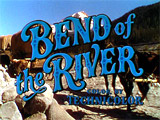
|
The classic masterpiece was linked at the time to the McCarthy hearings (as an allegorical tale about Hollywood's failure to stand up to anti-Communist accusations, and to blacklisting), and considered un-American by some, including director Howard Hawks who helmed Rio Bravo (1959) as a reaction to it. Oscar-winning Gary Cooper starred as stoic, newly-married Marshal Will Kane. Just before departing, he learned that a group of vengeful killers, led by pardoned Frank Miller, were on their way to town on the 'high noon' train - and he was faced with a decision - should he leave with his loyal Quaker wife (Grace Kelly), or gather supporters to stand up to them? Deserted by most of the townsfolk, Kane faced his fate alone - with the clock tensely clicking toward 12 noon (allegedly the film was shot in real-time). With Tex Ritter's theme song: "Do Not Forsake Me, Oh My Darling" (the first Oscar-winning song from a non-musical). |
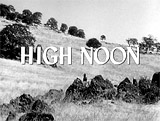
|
Rancho Notorious (1952)
Following Destry Rides Again (1939), this was the second Western specifically written for star Marlene Dietrich (as saloon singer Altar Keane), and Fritz Lang's third (and last) western. It was a distinctive, stylized (set-bound) drama with perverse Freudian overtones. Mel Ferrer also starred as infamous sharpshooter Frenchy Fairmont, involved in a love-triangle. The film's opening thematic ballad, "Legend of Chuck-a-Luck" had the refrain of "Hate, Murder, and Revenge." A Technicolored frontier revenge western (with an unrelated title), it told of events after the murder and rape of Wyoming ranchhand Vern Haskell's (Arthur Kennedy) sweetheart and fiancee Beth Forbes (Gloria Henry). Whitey (John Doucette), the mortally wounded partner of the murderer, provided Vern with a single "Rosebud"-type clue to the guilty man's destination: the word 'Chuck-a-Luck.' He searched for her surviving outlaw killer (revealed in a climactic shoot-out to be Kinch (Lloyd Gough)), hiding out at Altar Keane's Chuck-a-Luck horse ranch (named after a roulette-style casino gambling game), a known safe haven for outlaws. |
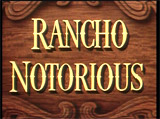
|
Hondo (1953)
One of John Wayne's best - but overlooked - westerns - he also served as the film's co-producer with his Batjac production company. The story, a classic Louis L'Amour story titled The Gift of Cochise, was basically a Western romance. Originally filmed in 3-D - a crazed fad at the time, which was highlighted during the ending's Apache attack sequence. It starred Wayne as half-Apache Indian wanderer and cavalry scout Hondo Lane (John Wayne) accompanied by a brown collie-like dog named Sam. He provided protection for down-to-earth, abandoned homesteader-settler woman Mrs. Angie Lowe (Geraldine Page in her screen debut, and an Oscar-nominated role) with young fatherless 10 year-old son Johnny (Lee Aaker), living in threatening Apache territory. She had previously been married to Ed Lowe (Leo Gordon) - a no-good gambler, cheat and adulterer, and Hondo had had a brief marriage to a now-deceased Apache bride. Hondo was forced to kill Mrs. Lowe's long-absent husband in self-defense. |
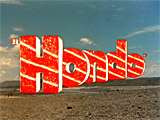
|
The Naked Spur (1953)
Nominated for a Best Screenplay Oscar, and noted for starring James Stewart in his third of five western collaborations with director Anthony Mann (also Winchester ’73 (1950), Bend of the River (1952), The Far Country (1954) and The Man From Laramie (1955)), in a Technicolored, vengeful bounty-hunter tale with only five acting-speaking roles. In the untamed Colorado Rockies, Howard Kemp (James Stewart), a tormented, brooding and manic anti-hero, was intent on tracking and capturing a wanted murderer and bringing him back to Abilene, Kansas for the advertised bounty. [Kemp had a mysterious past that was uncovered later during a delirious state of fever when he was suffering from a leg wound. Earlier, when he went off to fight for the Union in the Civil War, he trusted his faithless fiancee Mary with the title to his ranch and farmland, but then while he was away fighting in the war, she sold his property and ran off with another fellow.] Therefore, Kemp sought to apprehend cunning outlaw Ben Vandergroat (Robert Ryan) with a $5,000 bounty on his head (dead or alive), in order to repurchase his land in Abilene and settle down. Ben was found to be accompanied by blonde, short-haired, tomboyish 'traveling companion' Lina Patch (Janet Leigh). Lina was the daughter of one of Ben's deceased friends, Frank Patch, who was killed while robbing a bank in Abilene. Accused killer Vandergroat had murdered a marshal in Abilene, Kansas, and Kemp had been on his trail for a long time. The fearless Kemp first enlisted the aid of grizzled, luckless prospector Jesse Tate (Millard Mitchell) by claiming he was an official lawman, and would pay Jesse $20 for his time and trouble. The two were soon joined by dishonorably-discharged, amoral, playboyish and disreputable Union cavalry rider Lt. Roy Anderson (Ralph Meeker) (who it was revealed later was being pursued by a Blackfoot Indian war party, for defiling one of the chief's daughters). Things became more complicated when Ben was apprehended with Jesse and Roy's help, and Kemp was revealed as a mercenary bounty-hunter. Then, the two others wanted to split the reward three ways with him. During their trek back to Abilene, scoundrel Ben used persuasive tactics of psychological warfare (greed, discord, suspicion, mistrust, and jealousy within a love triangle) to create conflict among his three captors. Ben convinced Lina (with unpredictable shifting loyalties) to distract Kemp so he could escape from the back of a cave during one night, and he also unbuckled Kemp's saddle-strap so that he might topple the bounty-hunter off a steep ridge - but neither ploy fully worked. One bluff that did work was to convince Jesse to desert the group at night to visit a nearby goldmine. Besides a violent Blackfoot native Indian attack from twelve riders that ended up in a massacre (only Kemp was wounded in the leg), the exciting climax came at a raging riverside after Ben had ruthlessly killed Jesse. Ben positioned himself high up on a rock face, poised as a sniper with a rifle to ambush Kemp and Roy. As he fired at Kemp, Lina pushed Ben's rifle up, preventing him from firing accurately. Kemp climbed the face of the rocky cliff behind Ben and flung his "naked spur" (used to scale the cliff-face as a axe/piton) into his lower cheek or neck - after which he reeled around and Roy shot him from a distance and finished him off. Ben's corpse fell into the roaring river below. Roy was able to string a line across the rough water and retrieve the body - so that they could claim the reward. However, while swimming in the rapidly-flowing river, Roy was lethally struck by a gigantic log stump, drowned and was carried downstream. Kemp hauled Ben's body back to the shore by a rope, and became insanely single-minded and heartless - determined to claim the reward all for himself as he strapped the corpse on his horse. After Lina's pleadings to leave the ordeal behind them, Kemp gave up his potential blood-money bounty, buried Vandergroat's body in the ground, and then rode off with her to start a new life in California together. |
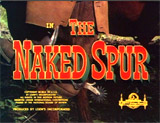
|
The wide-screen, Technicolored panoramic masterpiece recreated a symbolic myth: the age-old story of the duel between good and evil, the advent of civilization and progress into the wilderness (a world of roaming cattlemen, lawless gunslingers, and loners on horseback), a land-dispute conflict between a homesteader and cattle baron, and the coming of age of a young boy. Alan Ladd starred as the archetypal title character, a lone gunman with a shady and violent past who was taken in by the frontier family (and was soon enamoured by homesteading wife Marion played by Jean Arthur). He also became embroiled in the range wars between greedy cattle barons (led by Rufus Ryker (Emile Meyer)) and hard-working pioneering farmers (Joe Starrett portrayed by Van Heflin). Jack Palance also co-starred as the villainous black-garbed hired gun Jack Wilson. The film climaxed with wounded Shane's departure as young Joey Starrett (Brandon deWilde) cried out the famous tear-jerking line: "Shane. Shane! Come back! 'Bye, Shane." |

|
The Far Country (1954)
The fourth western, another dark revenge western, pairing Anthony Mann and James Stewart - this time set in the 'far country' of Alaska and Canada. During the Klondike Gold Rush, self-reliant, anti-hero cattle herder and loner Jeff Webster (Stewart) and sidekick Ben Tatum (Walter Brennan) hoped to sell their herd of cattle in Dawson City to fund their dream ranch in Utah. But they ran afoul of the film's antagonist: Scagway's corrupt, wealthy yet affable judge/Sheriff Gannon (John McIntire). During a bogus and unfair trial held in the saloon of Ronda Castle (Ruth Roman), they had their herd confiscated by the tyrannical judge. Afterwards, the seductress Ronda hired Webster to lead a group of travelers to her new saloon address, Dawson Castle, in the gold rush settlement town of Dawson City. During the ride, Webster restole his herd and took them to Canada. The film ended with the inevitable final shoot-out between the villainous Gannon and Webster. |
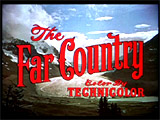
|
Johnny Guitar (1954)
An astonishing, and unusual one-of-a-kind camp cult classic rife with political allegory, repressed Freudian themes (guns as phallic symbols), gender-confusion, and presented as veiled commentary on the anti-communist McCarthy hearings and the activities of the House Un-American Activities Committee at the time. Starring Joan Crawford as strong-willed, non-conformist saloon owner Vienna (often dressed in black shirt, pants, and boots) in an Arizona small town during changing times, Sterling Hayden as the gun-crazed title character (Vienna's former lover Johnny 'Guitar' Logan, a gunslinger from Albuquerque), and Mercedes McCambridge as opposing gang-leader, contentious spinster and cattle rancher Emma Small. The sadistic Emma had a love-hate relationship with an outlaw named the Dancin' Kid (Scott Brady), one of Vienna's associates, while Vienna's business was about to boom due to the presence of the railroad, causing hatred and conflict among the black-clad townsfolk who demanded her exile. The film ended with Guitar's rescue of Vienna from a lynching, and a challenge between the two female leads - a bloody pistol shoot-out. |

|
River of No Return (1954)
A great-looking CinemaScopic western adventure/romance (director Preminger's first and sole oater), from a script inspired by Vittorio De Sica's The Bicycle Thief, and set during the 19th century Gold Rush. Recently released from prison, widower and dirt farmer Matt Calder (Robert Mitchum) was homesteading with estranged 9 year-old son Mark (Tommy Rettig), who had been cared for in a trading post town by sultry, ex-saloon hall girl Kay (Marilyn Monroe) during his sentence. [Matt had shot a man in the back who was threatening to kill his friend.] On their way to Council City (to register a gold mining claim won in a stud poker game) on a river raft over dangerous and deadly rapids, Kay and fiancee card-shark gambler Harry Weston (Rory Calhoun) were rescued by the Calders, although Harry stole Calder's only rifle and horse, and left his wife behind. Hostile Indian threats forced the remaining defenseless trio to take a treacherous journey down the 'river of no return' (the actual river was the Salmon River in Idaho) on the raft, as they watched their homestead burn. Along the way, they were beset by a wild mountain lion, a vengeful knife-wielding poker player/gold prospector, and an Indian attack. In Council City in the film's contrived ending, young Mark was forced to defend his father by shooting Harry in the back - similar to the crime for which Matt was incarcerated. In the resolution, they reconstituted themselves as a family and restarted their lives. |

|
Silver Lode (1954)
A low-budget, independent western (inspired by High Noon (1952)), with veiled yet obvious allegorical references to the Red Scare McCarthy hearings of the historical time period. Respected wealthy rancher/citizen Dan Ballard (John Payne) in the western town of Silver Lode had his Fourth of July wedding to wealthy and pretty fiancee Rose Evans (Lizabeth Scott) interrupted by four men from the town of Discovery, California. The group of deputies, led by accusatory and vengeful blonde Fred McCarty (Dan Duryea), claimed they were US marshals on a manhunt with a warrant to arrest him for the murder of Ned's brother and the robbery of $20,000 a few years earlier. Loyalty of the fickle townsfolk began to falter as wrongly-accused Ballard stalled the proceedings to track down evidence to clear his name and prove his innocence. The only two left believing persecuted Ballard were Rose and his brazen ex-mistress/saloon singer Dolly (Dolores Moran) in a bright purple dress. The taut and suspenseful film concluded with a showdown between a cornered and wounded Ballard and McCarty high up in the bell tower of the town's church, involving a (forged) telegram indicting McCarty's credentials and exonerating Payne, and a gunshot's bullet ricocheting off the giant bell. |
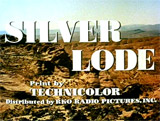
|
Vera Cruz (1954)
An action-packed, cynical western (and one of the first Hollywood productions filmed entirely in Mexico), and the first released in SuperScope, about two treacherous buddies greedy for gold in Revolutionary Mexico. It was one of the major forerunners of the 'spaghetti westerns' of the mid-1960s and Peckinpah's The Wild Bunch (1969). The plot was about two footloose American soldiers of fortune: a cynical, gentlemanly, ex-Confederate loner, Major Benjamin Trane (Gary Cooper) - a Southern landowner who lost everything during the Civil War, and his unreliable, misanthropic, always-grinning career-outlaw rival Joe Erin (Burt Lancaster). The duo met over a horse stolen from a Spanish soldier. Both were mercenaries, choosing to sign up with either crooked, French-supported Emperor Maximilian (George Macready) or peasant rebel Juaristas led by General Ramírez (Morris Ankrum). They joined forces with Maximilian to escort cunning, aristocratic French Countess Marie Duvarre (Denise Darcel) from Mexico City to the port of Vera Cruz, bound for Paris by boat, with a hidden gold cache of $3 million. They were aided by Erin's gang members (future stars Ernest Borgnine, Charles Bronson, and Jack Elam). The entire journey was a tale of scheming rivalry, shifting alliances, betrayal, and deceitful double-crosses, eventually leading to a shootout between the two (and Erin's death). |
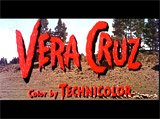
|
Bad Day at Black Rock (1955)
A tightly-written, suspenseful, dramatic action western film (with film noirish qualities), and one of the first Hollywood statements about the racist treatment of Japanese-Americans during World War II. Its themes were individual integrity, group conformity and complacency, and civic responsibility, while it allegorically denounced the Hollywood blacklisting of the 1950s McCarthy era. It tensely portrayed one-armed stranger John J. Macreedy (Spencer Tracy) who intrusively arrived in the half-forgotten town of Black Rock with only nine stereotypical townsfolk. Over a twenty-four hour period, he found himself unwelcome and facing several ominous situations, animosity, collective guilt, hypocrisy, and bigotry. The film built suspense by withholding information about the visitor's mysterious mission, and by creating a who-dun-it mystery regarding the hostile town's dark secret. Eventually, he learned the town's deepest secret, and fulfilled the promise he made to present a posthumous Congressional Medal of Honor for heroism to the farming father of a Japanese wartime buddy (Joe Komoko) who had saved his life in World War II on the battlefields of Italy. |
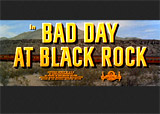
|
The Man From Laramie (1955)
The fifth (and final) western that paired Anthony Mann and James Stewart - another complex psychological western and comparable to Shakespeare's King Lear. The 'man from Laramie' - ex-cavalry officer Captain Will Lockhart (James Stewart) was accompanied by Charles O'Leary (Wallace Ford) (part-Apache) on a wagon mule train to the town of Coronado, NM to deliver supplies to storekeeper Barbara Waggoman (Cathy O'Donnell). Usually, he had to traverse his supply wagons through hostile Apache territory. His major obsessed objective (kept a secret for most of the film) was hateful revenge against those who sold repeating rifles to the Apaches, used to massacre a 12-man cavalry detachment at Dutch Creek that claimed his younger lieutenant brother's life months earlier. Lockhart soon became embroiled in a struggle in Coronado with Barbara's sadistic, loutish, volatile and psychopathic cousin Dave Waggoman (Alex Nicol), over trespassing charges and unintended theft of lagoon salt. During the misunderstanding, Dave destroyed Lockhart's three wagons and shot six of his mules, and Lockhart was lassooed and dragged through a fire. (Later during another encounter with Dave, he was shot/wounded in his shooting hand at point-blank range.) Alec Waggoman (Donald Crisp), the blind (physically and emotionally), wealthy and ruthless cattle baron patriarch of the Barb Ranch empire where the massacre had occurred, had two rival 'sons' engaged in a power struggle - Alec favored his bloodlusting natural son Dave over sensible and responsible hired hand/ranch foreman Vic Hansbro (Arthur Kennedy), who had been adopted and raised as an orphan. Vic's plan was to marry Waggoman's niece Barbara. Lockhart (who was falsely accused of two murders) was eventually made a hired hand by one of Alec's main rivals - Kate Canady (Aline MacMahon) - a tough rancher at Half Moon Ranch who at one time had been engaged to Alec Waggoman, but was jilted by him. It was discovered that Vic and Dave were complicit in the continuing gun-running arms-sales to the Indians. When Vic realized that the bloodlusting Dave was planning to sell 200 rifles to the Apaches, in order to arm them so that the natives would kill Lockhart and everyone at the Half-Moon Ranch, Vic was forced to kill Dave. And then after Lockhart saved Alec's life, he learned that it was Vic who had killed Dave. Ultimately in the surprise ending, Vic met his demise and death at the hands of outraged Apaches. |
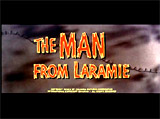
|
(chronological by film title) Introduction | Silents-1930s | 1940s | 1950-1955 | 1956-1959 | 1960-1965 1966-1969 | 1970s | 1980s-1990s | 2000s | 2010s |